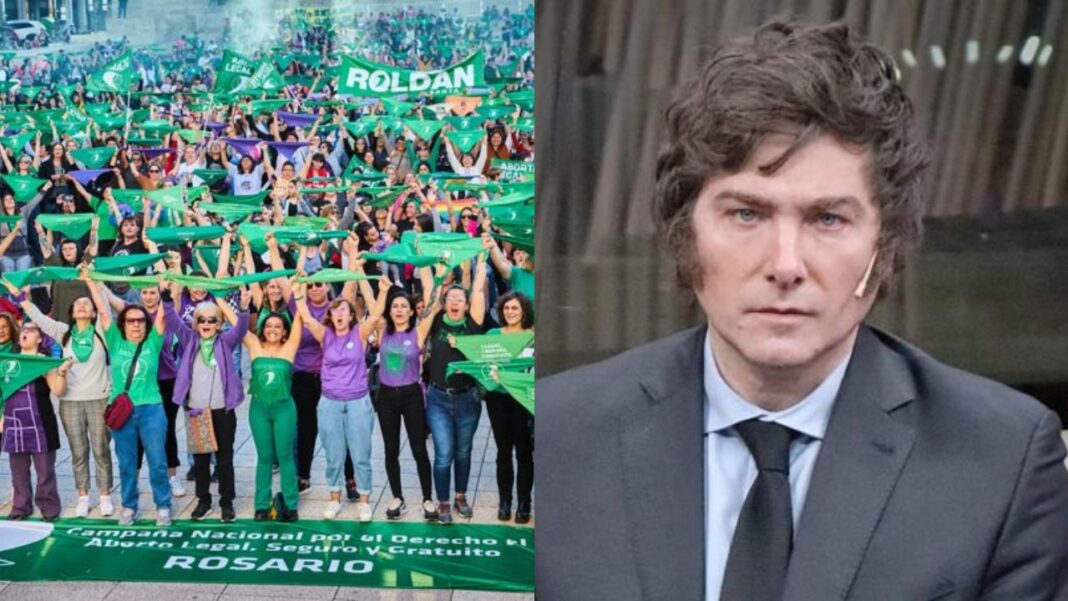Denied Rights in Latin America
December 30, 2020 marked a turning point in Argentina’s reproductive rights. However, four years later, the Voluntary Interruption of Pregnancy Law faces a new enemy: defunding and bureaucracy driven by President Javier Milei’s administration.
A historic victory now under erosion
On a sunny January morning in 2021, the streets of Buenos Aires burst with a wave of green scarves fluttering in the wind. The National Congress had just passed the Voluntary Interruption of Pregnancy Law, legalizing abortion up to the 14th week of gestation — a historic milestone that made Argentina one of the few countries in Latin America to guarantee legal, safe, and free abortion.
Related: Is Argentina losing the right to protest? This is the terrifying outlook of repression
That image of women hugging, crying, and singing captured a hard-fought victory. But four years later, that right faces new threats.
From legal recognition to bureaucratic obstacles
Congresswoman Silvia Lospenato warned from the beginning:
“THIS IS THE CENTURY OF WOMEN’S RIGHTS. LET’S BRING ABORTION OUT OF THE SHADOWS, LEGISLATE FOR WOMEN’S HEALTH AND AUTONOMY.”
Since Javier Milei took office in December 2023, the law has entered a critical phase: one of administrative hurdles. While there is no direct attempt to repeal it, a weakening strategy is evident.
Silvina Ramos, co-director of REDAAS, explains it clearly:
“FROM DRUG PROCUREMENT TO MEDICAL CERTIFICATIONS, EVERYTHING SEEMS DESIGNED TO STALL PUBLIC POLICY.”
“A thousand ways to sabotage”
Congresswoman Mónica Schlotthauer warns:
“EVEN IF THEY DON’T STRIKE DOWN THE LAW, THEY CAN SABOTAGE IT FROM WITHIN HOSPITALS — BY SLASHING BUDGETS, CUTTING OFF SUPPLIES OF ABORTION PILLS. THERE ARE A THOUSAND WAYS TO UNDERMINE IT.”
Meanwhile, the official discourse seeks to dodge responsibility. Presidential spokesperson Manuel Adorni insists abortion “is not on the president’s agenda.” But Milei’s own statements contradict that position.
“FOR ME, ABORTION IS AGGRAVATED MURDER COMMITTED BY A FAMILY MEMBER,” declared the president, aligning himself with conservative sectors.
Conservative narratives on the rise
Vice President Victoria Villarruel reinforces this view with statements like:
“FOR THE CULTURE OF DEATH, CHILDREN ARE A BURDEN RATHER THAN A SIGN OF HOPE.”
Pro-life movements celebrate what they see as progress:
“MILEI GAVE US A SIGN BY COMPLETELY DEFUNDING THE GOVERNMENT AGENCIES THAT DISTRIBUTED MISOPROSTOL AND OTHER ABORTION PROTOCOLS,” says Juan Ignacio Videla.
In Argentina, the streets refuse to surrender
From feminist collectives, the response has been swift.
“NO RIGHT CAN BE TAKEN AWAY,” declares Dante, a member of Pan y Rosas. “IF MILEI DOESN’T TOUCH ABORTION, IT’S BECAUSE HE KNOWS THAT ONE WRONG COMMENT WILL FILL THE STREETS.”
And so it happens: young people who never lived through clandestine abortions now march with green scarves as symbols of resistance, identity, and memory.
Between religious resistance and personal testimonies
The Catholic Church has intensified its offensive. From pulpits and so-called “spiritual healing retreats,” it promotes the idea that abortion leaves soul-deep wounds.
“THIS LAW MUST GO, BECAUSE YOU CAN’T KILL THE SOUL,” says Débora, a housewife from Mendoza.
A right under siege
In Milei’s Argentina, legal abortion is no longer just a celebrated achievement. It is a right defended daily — against budget cuts, conservative rhetoric, and administrative barriers. As those waving green scarves remind us:
“THEY SHALL NOT PASS.”




